You ever lie in bed, totally wiped out, but your brain’s like, “Nah, let’s rerun every awkward moment from today”? It’s like your head’s hosting a late-night talk show, and you’re the only guest. For me, it hits hard around 11 PM. I’ll be yawning all day, barely keeping my eyes open, but the second I hit the pillow, my mind’s off to the races. “Did I sound weird in that meeting?” “What if I forgot to pay that bill?” “Should I just quit my job and move to a farm?” One thought spirals into a dozen, and suddenly it’s 2 a.m. 😴

Lately, I’ve noticed it’s not just random worries keeping me up. It’s this nagging fear that I’m missing out on something a friend’s epic trip, a coworker’s big promotion, or just the feeling that everyone’s living better than me. That’s FOMO, the fear of missing out, and it’s like gasoline on the overthinking fire. Social media doesn’t help, with its endless stream of highlight reels making me feel like I’m falling behind.
This article’s gonna dive into why your brain won’t shut up at night, how FOMO makes it worse, and some real, practical ways to calm it down so you can actually sleep. We’ll look at why this happens, what it’s doing to you, and how to take back your nights. Wanna learn how to quiet that mental chatter? Check out our guide on mindful living for more tips, and this Healthline article has some solid science on overthinking. Plus, we’ve got a cool infographic coming up to help you spot when FOMO’s sneaking into your thoughts. Ready to chill your brain? Let’s get started

Mental Wellness Test
Where Does Your Mind Need the Most Support?
Discover your emotional health in under 4 minutes.
Find out if what you’re feeling is:
burnout, anxiety,trauma
or just too many open tabs in your brain.
No pressure – Just clarity
What’s Overthinking at Night?
Overthinking at night is when your brain just won’t quit, even when you’re begging it to let you sleep. It’s like your thoughts are on a hamster wheel, spinning through worries, regrets, or random what-ifs. Maybe you’re replaying a convo from work or stressing about a text you sent. For me, it’s like my brain decides bedtime’s the perfect time to solve all my life’s problems or make them up.
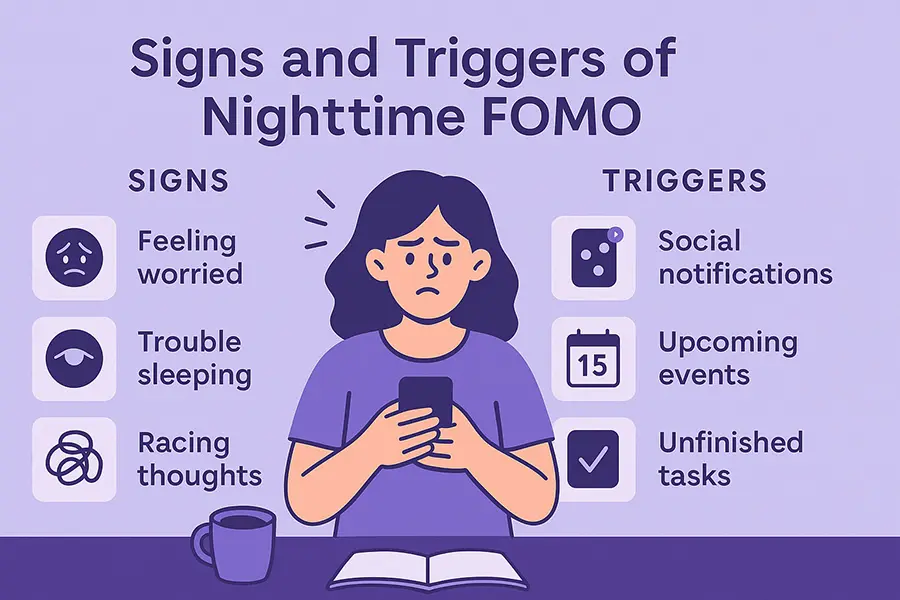
It’s not just you. Tons of people deal with this, especially in their 20s and 30s when life’s full of pressure jobs, relationships, figuring out who you are. And FOMO? That’s the sneaky guest star in this mental talk show, making you feel like you’re missing out on everything, even rest. According to Verywell Mind, racing thoughts are super common and often tied to stress or anxiety. It’s like your brain’s trying to process a whole day’s worth of stuff when you finally lie down.

Why Your Brain Goes Wild at Night
So, why does your brain pick bedtime to go full-on chaos mode? It’s not just random there’s science and psychology behind it. Here’s the breakdown:
- No Distractions: During the day, you’re busy with work, friends, or scrolling your phone. But at night, it’s just you and your thoughts. With no distractions, your brain’s like, “Cool, let’s unpack everything.” WebMD says this lack of external stimuli lets worries take center stage.
- Memory Processing: Your brain’s hard at work during sleep, especially in the REM stage, sorting through memories and emotions. Sometimes, it brings up unresolved stuff, like that awkward email you sent, and you start overanalyzing.
- Stress Hormones: If you’re stressed, your cortisol levels might stay high at night, keeping you alert when you wanna be snoozing. UCLA Health notes that stress can make your brain feel wired.
- FOMO’s Nighttime Takeover: Social media’s endless stream of parties, trips, and achievements can make you feel like you’re missing out, even when you’re trying to rest. That fear of falling behind keeps your mind buzzing.
- Habits Gone Wild: If you’ve gotten into the habit of overthinking at night, your brain might just associate bedtime with worry time. It’s like Pavlov’s dog, but instead of drooling for food, you’re stressing for no reason.
I remember one night, I was lying in bed, exhausted, but my brain was stuck on a friend’s Instagram post about their fancy new job. I started spiraling: “Why am I not there yet? Am I slacking?” It was like my mind was throwing a pity party I didn’t sign up for
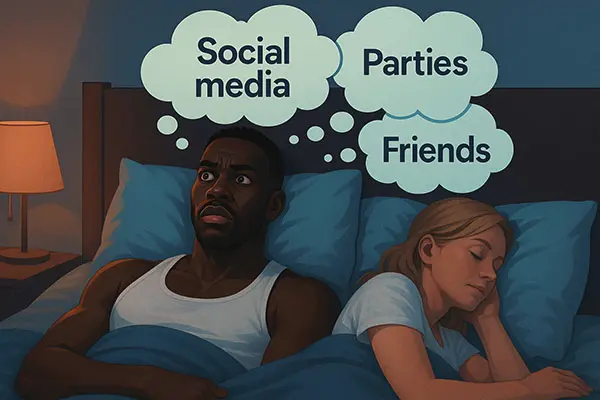
How FOMO Fuels the Nighttime Spiral
FOMO, or fear of missing out, is that anxious vibe you get when you think everyone else is living their best life while you’re stuck on the sidelines. It’s not just about missing parties it’s about feeling like you’re missing out on life. A new job, a cool trip, a trending hobby it’s like the world’s moving on without you.

Social media’s the worst for this. You’re scrolling at 11 PM, seeing your friend’s beach vacation or your coworker’s big promotion, and suddenly your brain’s like, “You’re falling behind!” Verywell Mind says social media amplifies FOMO by showing you curated highlight reels, making your own life feel small.
At night, when you’re alone with your thoughts, FOMO can hit hard. You’re not just overthinking your day you’re worrying about all the things you could be doing. I had a friend who’d stay up late checking LinkedIn, stressing about not networking enough. Another buddy couldn’t stop scrolling Twitter, afraid they’d miss some big news. It’s like your brain’s convinced you’re one click away from being irrelevant.
FOMO’s sneaky because it’s not just about events. It’s about feeling disconnected or inadequate. And when you’re trying to sleep, those feelings can spiral, keeping you up way past your bedtime
The Toll of Overthinking and FOMO
Overthinking and FOMO aren’t just annoying they can mess with your whole life. Here’s how:
- Sleep Deprivation: When your brain’s racing, you’re not getting the deep sleep you need. That means waking up groggy, cranky, and ready to snap at the barista who got your order wrong. Sleep Foundation says poor sleep can make anxiety worse, creating a vicious cycle.
- Mental Health Struggles: Chronic overthinking can fuel anxiety and depression. It’s like your brain’s stuck in a loop of negative thoughts, making everything feel heavier.
- Physical Health Hits: Lack of sleep is linked to serious stuff like a weaker immune system and even heart problems. Bradley University notes that poor mental health can up your heart disease risk by 67%. Scary, right?
- Productivity and Relationships: When you’re running on no sleep, you’re not exactly crushing it at work or being the best friend. I’ve been that zombie who zoned out during a convo because I was too tired to care.
- FOMO’s Mental Drain: FOMO keeps you in a state of hyper-vigilance, always checking what others are doing. It’s exhausting and steals your ability to just be.
One time, I stayed up till 3 a.m. worrying about a friend’s cryptic Instagram story. Was she mad at me? Did I miss something? The next day, I was a mess at work, forgot a deadline, and felt like I was failing at everything. It’s not just one bad night it adds up

Practical Tools to Quiet Your Mind
Alright, let’s get to the good stuff how to calm that noisy brain so you can actually sleep. These are real, practical tips I’ve tried, backed by experts, that don’t require you to become a Zen master overnight.
1. Mindfulness and Meditation
Mindfulness is just about being in the moment, no fancy stuff needed. When your brain’s spiraling, try focusing on your breath. Inhale for 4, hold for 4, exhale for 4. Do it a few times. It’s like hitting pause on your thoughts. Apps like Calm have sleep meditations that are super chill. I started with 5 minutes a night, and it’s like my brain learned to take a breather.
2. Thought Blocking
This one’s weird but works. Pick a random word like “cloud” or “pizza” and repeat it in your head over and over. It’s like jamming the signal of your racing thoughts. Sleepstation calls this “articulatory suppression,” and it’s surprisingly effective. I tried it with “wave,” and my brain got bored and gave up.
3. Scheduled Worry Time
Set aside 10-15 minutes in the afternoon to worry on purpose. Write down everything stressing you out bills, work, that weird text. Then, at bedtime, tell yourself, “I already dealt with this.” It’s like giving your brain a break. The Washington Post says this can help you fall asleep faster.
4. Journaling
Grab a notebook and scribble down whatever’s in your head. Worries, to-do lists, random thoughts just get it out. It’s like emptying your brain’s junk drawer. I keep a journal by my bed and write for 5 minutes before sleep. It’s like telling my thoughts, “You’re on paper now, leave me alone.”

5. Gratitude Practice
FOMO makes you focus on what you’re missing, so flip the script. Write down three things you’re grateful for each night. Could be small, like a good coffee, or big, like a supportive friend. This shifts your brain from scarcity to abundance. I started doing this, and it’s like my mind stopped chasing what I don’t have.
6. Nervous System Grounding
When FOMO or overthinking hits, try grounding. The 5-4-3-2-1 technique is great: name 5 things you see, 4 you can touch, 3 you hear, 2 you smell, 1 you taste. It pulls you back to the present. I keep a smooth stone on my nightstand to hold when I’m anxious it’s weirdly calming.
7. Question Your FOMO
When you feel like you’re missing out, ask, “Would I even enjoy that, or do I just feel I should?” Often, you realize you don’t even want what you’re stressing about. I used to get FOMO over big parties, but then I realized I’d rather be home with a book.
8. Ditch the Screens
Put your phone down at least an hour before bed. Blue light messes with your sleep hormones, and scrolling through Instagram fuels FOMO. I leave my phone in the living room now, and it’s like my brain finally gets a break.

9. Move Your Body
Exercise during the day can tire out your brain and body, making it easier to sleep. Just don’t do it right before bed it can rev you up. A 20-minute walk in the afternoon works wonders for me.
10. Sleep Sanctuary
Make your bedroom a calm zone cool, dark, quiet. Use blackout curtains, a comfy mattress, maybe a white noise machine. My bedroom’s like a cave now, and I love it.
These aren’t magic fixes, but they’re doable. Start with one or two and see what clicks
Other articles that will definitely help you:
Overthinking and FOMO for the LGBTQ+ Community
For folks in the LGBTQ+ community, overthinking and FOMO can hit extra hard. Navigating societal pressures, family dynamics, or identity struggles can keep your brain buzzing at night. A friend of mine who’s queer said they’d lie awake worrying about coming out at work or dealing with online hate. It’s like FOMO on steroids feeling like you’re missing out on acceptance or belonging.
Setting digital boundaries, like muting toxic accounts, and practicing self-compassion can help. Journaling about your experiences or joining affirming spaces, like queer-friendly support groups, can also ease the mental load. It’s about creating a safe space for your mind to rest. 😊
The Science Behind It
Let’s get nerdy for a sec. Overthinking and FOMO aren’t just in your head they’re wired into your brain. When you’re stressed, cortisol levels stay high, keeping you alert when you wanna sleep. UCLA Health says this can cut sleep quality by 30%.

Your brain’s default mode network (DMN) kicks in when you’re not focused on tasks, like at night. It’s great for creativity but can also lead to rumination, especially if you’re anxious or scrolling social media. FOMO’s a big player here it triggers the same stress response as social exclusion did for our ancestors, when being left out meant danger. That’s why it feels so physical, like a tight chest or racing heart.
Studies show FOMO’s linked to anxiety and depression, especially in young adults. One study found 3 in 4 young adults report FOMO, often tied to social media use (WebMD). Lack of sleep makes it worse, increasing your risk of mental health issues and even physical problems like heart disease.
| Impact | Statistic | Source |
|---|---|---|
| Stress Reduction | 30% decrease with less screen time | UCLA Health |
| Mental Health | 75% of young adults report FOMO | WebMD |
| Sleep Quality | Improved with reduced blue light | Sleep Foundation |
| Physical Health | 67% higher heart disease risk with poor sleep | Bradley University |
Your brain’s not built to run at full speed all night. These tools can help it slow down

Conclusion
Overthinking at night, especially when FOMO’s in the mix, can feel like a never-ending battle. But you’re not stuck. Your brain’s just doing its thing, trying to process a world that’s always on. With small steps like journaling, breathing, or cutting back on social media you can quiet that mental chatter and actually get some rest.
You’re not missing out on your life you’re living it. The best moments are often the quiet ones, the ones you don’t post or share. So, tonight, put down your phone, take a deep breath, and give yourself permission to just be. You belong right where you are, and your brain deserves a break. 😊

Citations:
- Verywell Mind: Explains common causes of nighttime racing thoughts (stress, anxiety, caffeine) and offers strategies like worry journaling, meditation, screen time limits, and bedtime routine tweaks to improve sleep
- Healthline: Shares effective methods to stop overthinking, including grounding, meditation, action steps, and seeking professional support
- WebMD: Highlights how FOMO and constant social media exposure increase stress and worsen mental health, and recommends setting limits on screen time
- Sleep Foundation: Covers how nighttime anxiety triggers insomnia and presents calming techniques like mindfulness and deep breathing to reduce nighttime hyperarousal
- The Washington Post: Lists six sleep-ready strategies like scheduling “worry time,” soothing distractors, exposure-based techniques, and processing buried feelings to ease overthinking at night
Don’t miss the related articles
- Self-Care and Digital Minimalism: Reclaiming Your Attention
- A Gentle Morning Routine That Doesn’t Feel Like a Chore
- What Is Emotional Self-Care and Why You Probably Need It
- What Is Mindful Living and How Can You Start Today?

FAQ
FOMO triggers your body’s stress response, like it’s sensing danger. Back in the day, being left out of the group could mean survival risks, so your brain still reacts like it’s a big deal. It’s why you might feel a racing heart or tight chest when you see others’ highlight reels.
Ambition’s awesome it’s driven by your goals and feels energizing. FOMO’s more about fear and comparison, leaving you drained and anxious. If you’re excited about a goal, that’s ambition. If you’re stressed about keeping up, it’s probably FOMO.
Probably not completely it’s a human thing. But you can totally manage it with boundaries and practice. Over time, you’ll care less about what you’re “missing” and more about what you’ve got.
Your brain’s got no distractions at night, so it starts processing everything stress, worries, FOMO. Plus, things like screen time or high cortisol can keep you wired when you wanna sleep.
It might take a bit your brain’s used to overthinking. Keep at it, and if it’s still rough, talking to a therapist can give you extra tools.
Ultimate Mental Wellness Test: Discover Emotional Health Just in 3 Min
Ever wonder where you stand with your mental health? That’s where our quick question Mini Mental Health Check comes in. It’s like a quick peek into your brain, giving you insights into your anxiety, burnout, and self-esteem levels.
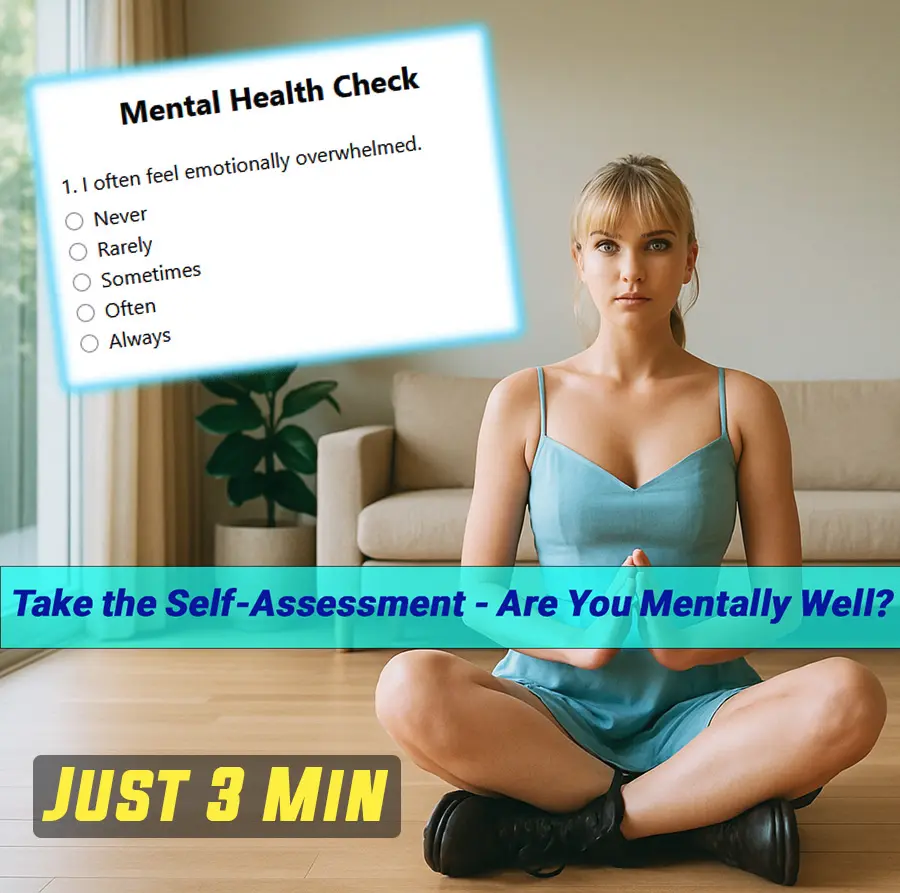
✨ Last updated on 08.08.2025
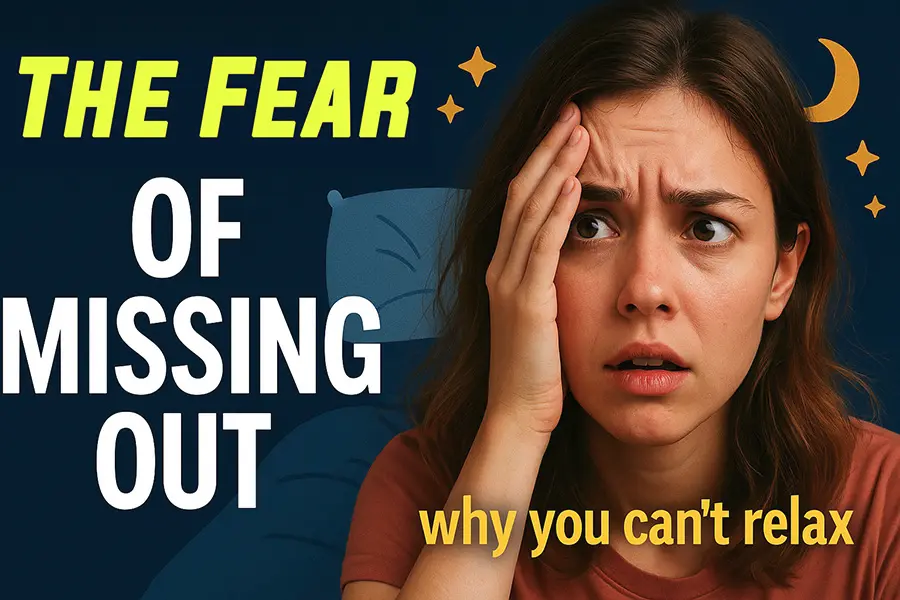

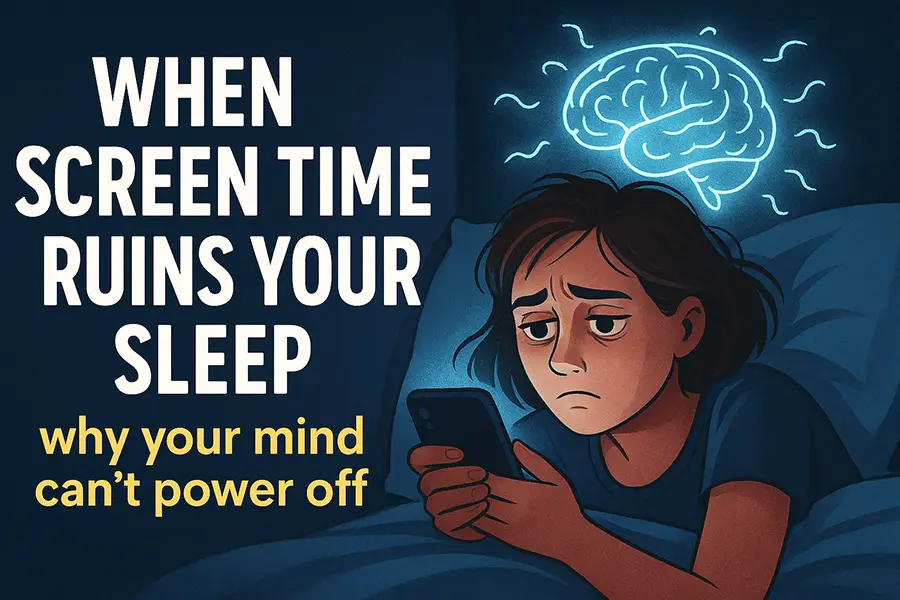



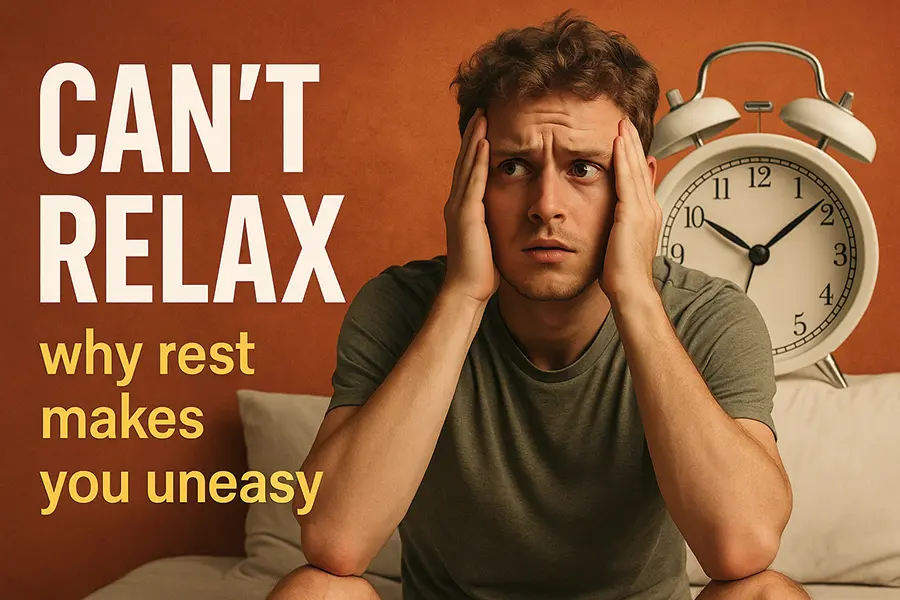

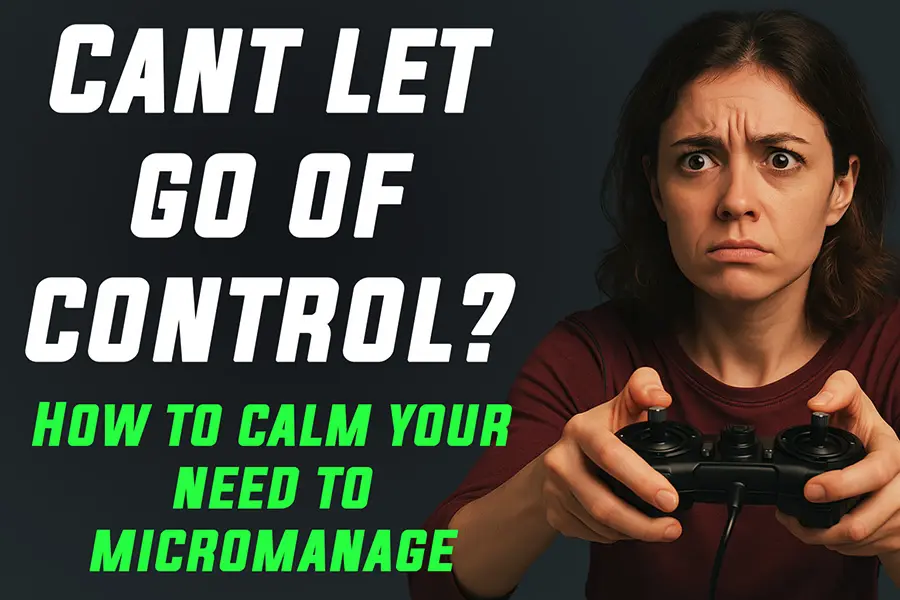


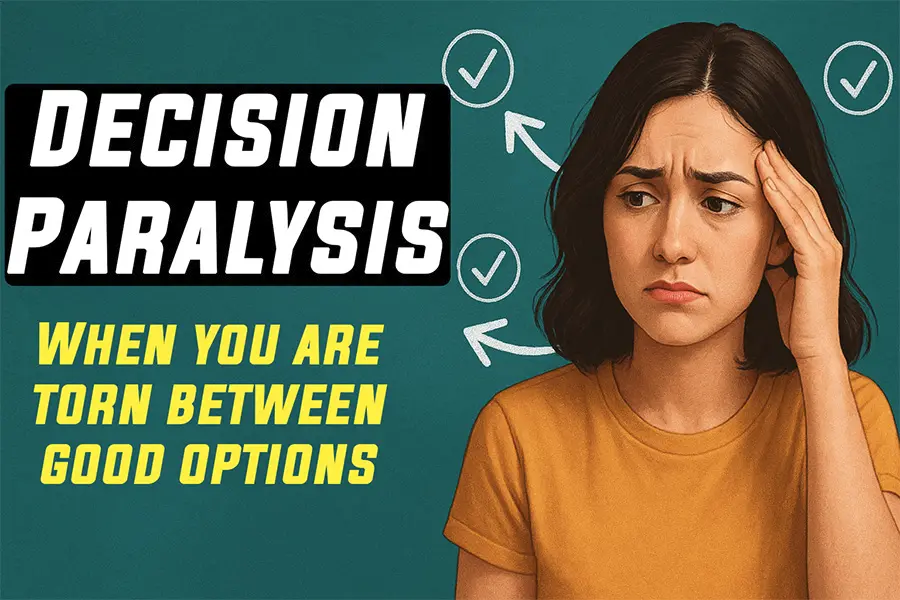










Leave a Reply